
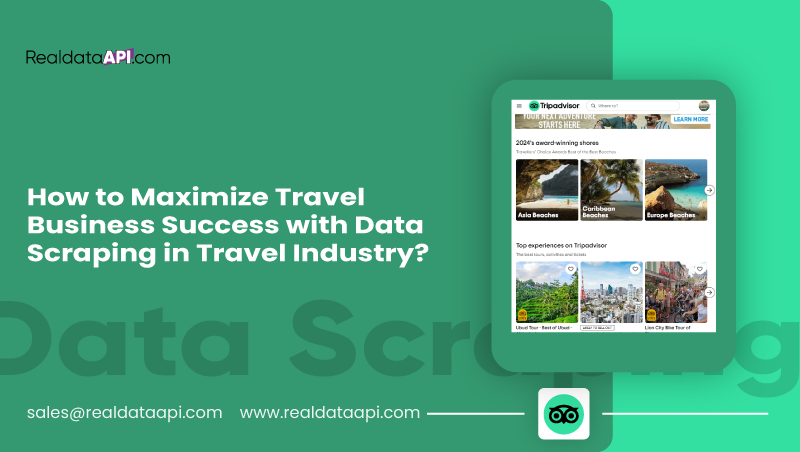
Introduction
In the highly competitive landscape of the travel industry, the significance of data scraping cannot be overstated. Data scraping in the travel industry involves using specialized tools, such as a travel data scraper or platforms like TripAdvisor scraper, to extract valuable information from diverse sources. This process, often called travel data collection, empowers businesses with critical insights that can propel them toward success.
One of the primary benefits of leveraging data scraping in the travel sector is the ability to extract comprehensive and real-time data. Whether pricing information, customer reviews, or competitor data, a well-implemented travel data scraper enables businesses to stay updated with the latest trends and market dynamics. This, in turn, facilitates effective price comparison and market research, allowing companies to make informed decisions and stay ahead of the curve.
Businesses can gain a competitive edge by strategically employing data scraping techniques to extract travel industry data. The insights derived from these efforts can inform pricing strategies, identify emerging trends, and enhance overall market positioning. Data scraping becomes a powerful tool for navigating the intricacies of the travel industry, enabling businesses to optimize their operations, improve customer experiences, and ultimately achieve lasting success.
Understanding Data Scraping in Travel
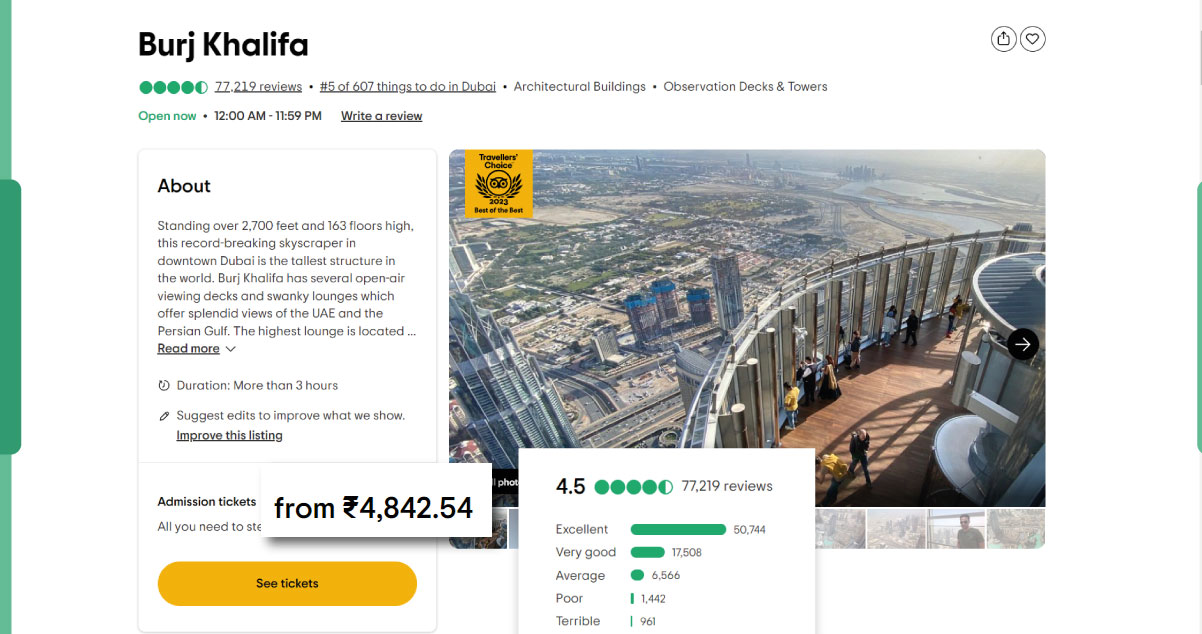
Data scraping in the travel industry is a pivotal technique involving the automated extraction of information from various online sources, enhancing the industry's ability to gather valuable insights. Data scraping utilizes specialized tools like a travel data scraper or dedicated platforms such as a TripAdvisor scraper to extract relevant data systematically. This process, also known as travel data collection, gives businesses a competitive advantage.
In the travel sector, the relevance of data scraping is evident in its ability to provide real-time and comprehensive information critical for decision-making. For instance, businesses can utilize data scraping to extract pricing details, customer reviews, and competitor information. This extracted data supports effective price comparison and aids in conducting market research, enabling companies to make informed strategic decisions.
Real-life examples of successful implementations highlight how data scraping has revolutionized the travel industry. From optimizing pricing strategies based on competitor insights to fine-tuning marketing campaigns through analysis of customer reviews, data scraping has become a cornerstone for businesses seeking to stay agile in a dynamic market.
These examples underscore the transformative impact of data scraping, positioning it as an invaluable tool for companies striving to enhance their operational efficiency and gain a competitive edge in the travel industry.
Identifying Key Data Sources
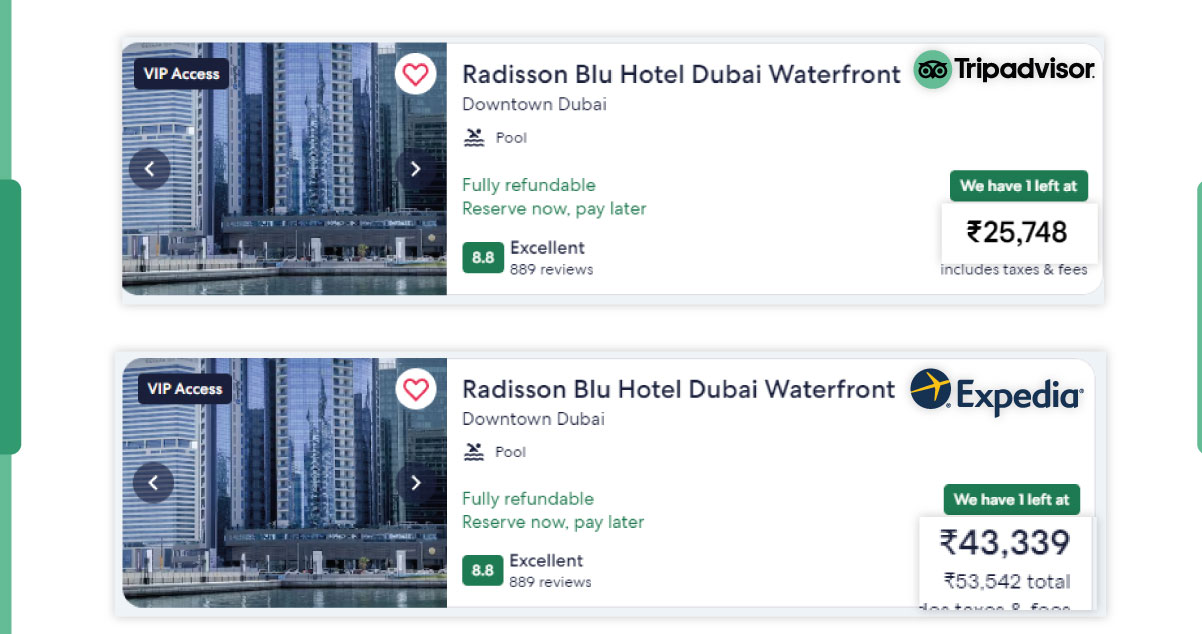
In the travel industry, identifying critical data sources is essential for harnessing the full potential of data scraping. A travel data scraper, including specialized tools like the TripAdvisor scraper, can be employed to explore diverse data outlets, offering valuable insights for business optimization.
One primary data source is customer reviews on platforms like TripAdvisor, where sentiments and feedback provide a rich resource for businesses to gauge customer satisfaction and improve services. Pricing information on various travel websites is another crucial data source, enabling companies to conduct thorough price comparison analyses. Businesses can strategically position themselves in the market by extracting data related to competitors' pricing strategies.
Furthermore, data scraping can target flight and accommodation availability, helping companies stay informed about real-time inventory. Social media platforms also contribute to data sources, providing information on trending destinations and customer preferences and aiding market research efforts. Additionally, weather data and local events can be scraped to enhance the personalization of travel offerings.
Exploring these diverse data sources through techniques like data scraping in the travel industry is paramount. The insights obtained not only facilitate business optimization but also empower companies to make informed decisions, adapt to market changes, and maintain a competitive edge in the dynamic landscape of the travel sector.
Implementing Effective Data Scraping Strategies
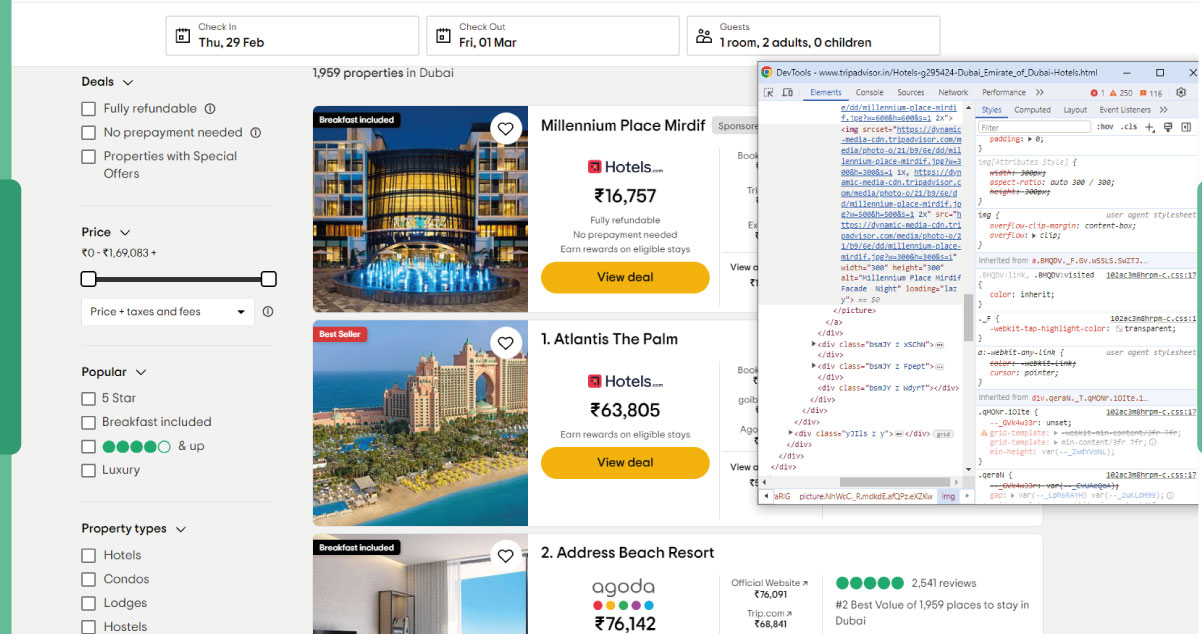
Implementing effective data scraping strategies is crucial for success in the travel industry. Leveraging a travel data scraper, such as the renowned TripAdvisor scraper, requires adherence to best practices to ensure efficient data extraction and business optimization.
Firstly, businesses should clearly define their objectives and the specific data they intend to scrape. This targeted approach helps streamline the process and ensures the extracted data aligns with the company's strategic goals. Additionally, it is essential to stay compliant with legal and ethical considerations, respecting the terms of service of the targeted websites.
From a technical standpoint, selecting the right tools and methodologies is paramount. Businesses can choose between web scraping libraries, APIs, or custom scripts based on their needs. Employing advanced scraping techniques, such as dynamic content handling and pagination, enhances the accuracy and completeness of data extraction.
Regularly monitoring and maintaining scraping processes are essential to adapt to changes in the targeted websites' structure or policies. Implementing rate limiting and respecting robots.txt guidelines helps prevent disruptions and maintain a positive relationship with the data sources.
An adequate data scraping strategy in the travel industry involves meticulous planning, technical proficiency, and ongoing maintenance. By incorporating best practices, businesses can harness the power of data scraping to conduct thorough market research, enable price comparison, and gain a competitive advantage in the dynamic travel sector.
Leveraging Data Insights for Business Growth
Leveraging data insights is a pivotal aspect of driving business growth in the travel industry through data scraping. With tools like a travel data scraper or specialized solutions like the TripAdvisor scraper, businesses can extract valuable data and transform it into actionable insights for strategic decision-making.
Extracted data can be analyzed for various purposes, including market research and price comparison. By scrutinizing competitor pricing strategies, businesses can optimize their pricing models to stay competitive. Understanding market trends and customer preferences through data scraping enables businesses to tailor their offerings, enhancing overall customer satisfaction.
One exemplary application is personalized marketing. Insights gained from scraped data allow businesses to craft targeted marketing campaigns, reaching specific demographics with tailored messages. This personalized approach has significantly improved customer engagement and conversion rates.
Moreover, data-driven decision-making extends to inventory management and service optimization. Real-time data on travel patterns and accommodation preferences aid in forecasting demand, ensuring businesses can adjust their offerings promptly.
Showcasing examples of how insights from data scraping drive business success emphasizes its transformative impact on the travel industry. By harnessing these insights, businesses can make informed decisions, refine strategies, and achieve sustainable growth in this dynamic sector.
Overcoming Challenges and Ensuring Compliance
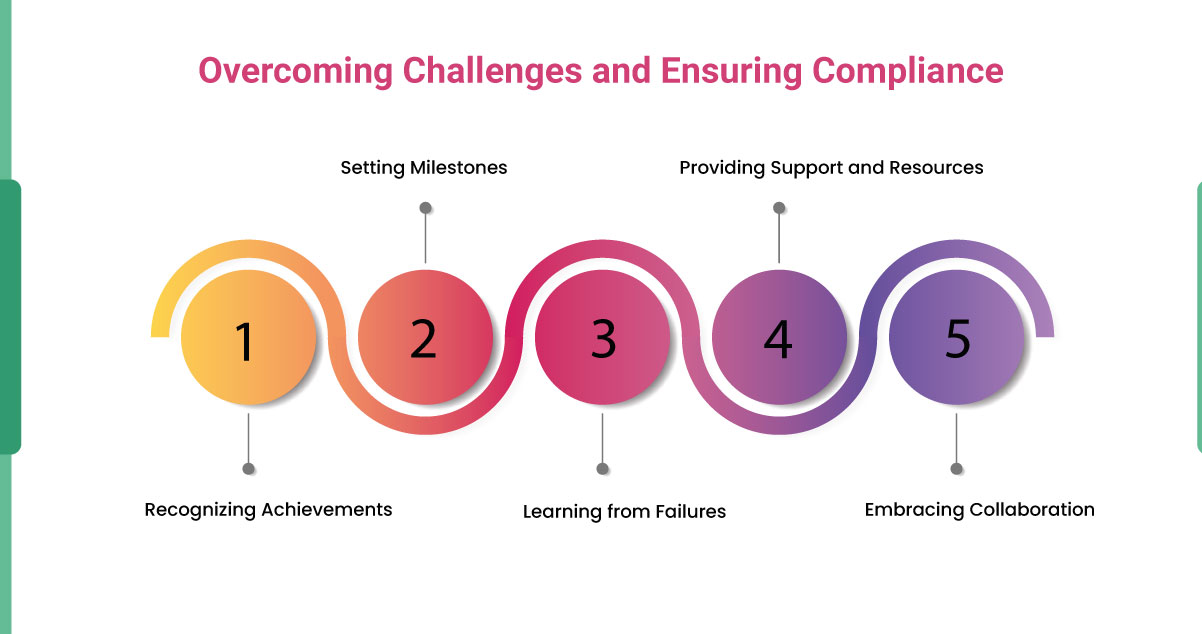
While data scraping offers immense benefits in the travel industry, navigating potential challenges and ensuring compliance with data protection regulations is essential. Utilizing tools like a travel data scraper or platforms like the TripAdvisor scraper introduces specific risks that businesses must address.
One challenge involves the dynamic nature of websites, which may undergo changes in structure or terms of service. Regular monitoring and adaptation of scraping processes are crucial to maintaining data extraction accuracy. Additionally, legal considerations must be considered, as scraping data without proper authorization can lead to legal repercussions.
Ensuring compliance with data protection regulations, such as GDPR, is paramount. Travel businesses must obtain consent from users before scraping personal information and adhere to data minimization and purpose limitation principles. Implementing measures like anonymizing or pseudonymizing data can mitigate privacy risks.
To overcome technical challenges, businesses should employ ethical scraping practices, respecting the guidelines set by websites through robots.txt files. Developing a transparent and ethical approach to data scraping safeguards against legal issues and fosters positive relationships with data sources.
Addressing challenges associated with data scraping in the travel industry requires a balanced approach that combines technical vigilance with legal compliance. By navigating these challenges effectively, businesses can harness the power of data scraping while maintaining ethical standards and regulatory adherence.
Case Studies
Real Data API has driven significant growth for travel businesses through adequate data scraping strategies. One notable success story involves a leading travel agency that utilized a travel data scraper, including the renowned TripAdvisor scraper, to extract and analyze vast amounts of travel industry data. The agency conducted precise market research and optimized pricing strategies by extracting pricing information and customer reviews.
Another case highlights a hotel chain that employed data scraping to enhance its price comparison capabilities. Leveraging a travel data scraper allowed the hotel chain to gather real-time pricing data from competitors, enabling them to adjust their rates dynamically. This adaptive pricing strategy not only improved competitiveness but also resulted in increased bookings and revenue.
Furthermore, a tour operator utilized data scraping for travel data collection from various sources, including social media platforms. This data was then analyzed to identify emerging travel trends and popular destinations, allowing the operator to tailor their offerings to current market demands. The insights derived from data scraping optimized their product offerings and facilitated targeted marketing, resulting in a notable boost in customer engagement and bookings.
These case studies underscore the transformative impact of data scraping, showcasing how businesses in the travel industry can achieve substantial growth by harnessing the power of Real Data API and other advanced tools.
Conclusion
Data scraping emerges as a pivotal tool for achieving success in the travel industry, offering invaluable insights for strategic decision-making. By leveraging tools like Real Data API, businesses can extract and analyze vast amounts of data, optimize pricing, conduct market research, and tailor their offerings to customer preferences. As the travel landscape evolves, embracing data scraping strategies becomes essential for staying competitive. We encourage readers to explore the possibilities and implement data scraping techniques to unlock the full potential of their businesses. Take the first step towards success today!













